How Tim Paine, the accidental captain, saved Australian cricket
Plucked from obscurity to save a disgraced Test team, few thought he would last. But Tim Paine was made for this moment.
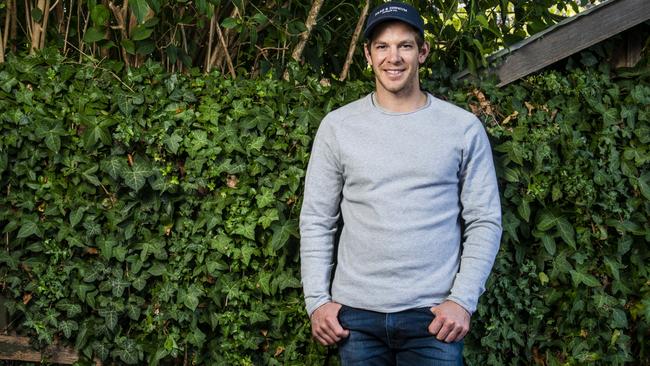
Sally Paine made her way along the corridor on the players’ floor of the Cape Town hotel on the evening that wretched Test finished and walked through the open door to find her son Tim staring out the window into the African night. He didn’t hear her enter so she eased into an armchair and left him to that moment of quiet contemplation. It had been a torrid, terrible time. The day before, young Australian cricketer Cameron Bancroft had been caught using sandpaper on the cricket ball. That morning the captain Steve Smith and his deputy David Warner had both stood down. Sensing someone behind him, Paine turned around and looked at his no-nonsense mother. “Geez, mum, I’m the captain of the Australian cricket team.” Peas in a pod, they both shook their heads and laughed at the absurdity of the situation. If you didn’t laugh, you’d cry – and there was a lot of that taking place in the corridors and confines of that hotel.
It was March 2018. A few months earlier, Tim Paine couldn’t get a game for his home state. A year before he’d given up on cricket. Former captain and fellow Tasmanian Ricky Ponting had to talk him out of taking a job with a sporting goods manufacturer, asking him to give cricket one more chance. Australia owes Ponting a great debt for that. If Paine, the wicketkeeper, had not been in that team at that time, to whom would it have turned and how would it have turned out? If not for that conversation and a late change of heart by Australian selectors, Paine’s international career would have been a cameo, a tale of talent cruelled by injury and mental demons.
“I was proud of him but I felt sorry for him, too, because we couldn’t celebrate it or enjoy it,” his mother says of that night in Cape Town. “As a little kid he’d always wanted to play for Australia, and now he was the captain; they’d been talking about that since he was young, before he broke his finger and it all went to, well, you know.”
Soon after giving his mum the news, Paine excused himself. Teammates were hurting; he needed to put an arm around people. A staff member who was suffering acutely remembers being comforted by Paine. “It’s OK,” he’d said. “We’re going to get through this.”
“I saw something click inside him and off he went to work, he had a job to do, he wanted to find the boys because they were all in shock and he knew he had to talk to them,” Sally recalls. “I wasn’t surprised by that, but it was something to see the responsibility dawn on him.”
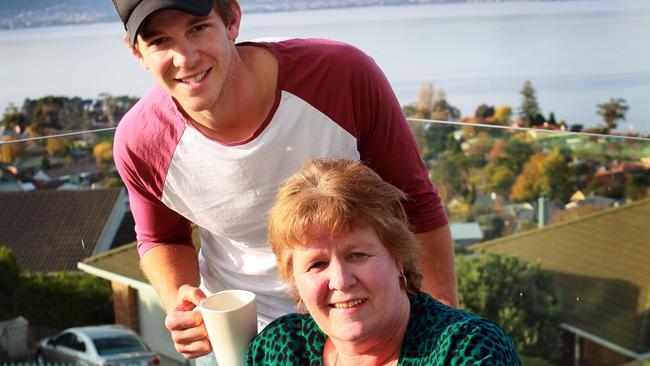
Back in Australia, the events in Cape Town had sparked outrage. Everybody from the prime minister down had turned against the team and begun to dissect its wider failings. Australia was angry and out of love with its cricket team. For players, the enormity of it was sinking in. In the midst of it all, hardly anybody noticed Paine’s elevation. “It was a horrible, strange time,” he recalls now. “I couldn’t enjoy it; to be honest I don’t think I enjoyed being captain for a long time. It was a terrible situation.”
Over the following days, things got worse. Smith was a wreck, crying constantly, inconsolable; support staff were so concerned they wouldn’t let him out of their sights. Bancroft appeared to have drifted off to a distant place, shadow-batting in the hotel foyer as the chaos surrounded him, apparently oblivious to the press pack assembled just outside the glass doors. Warner was lashing out in his grief and had excised himself from the players’ WhatsApp group, seeking the succour of his family. The trio were told they faced lengthy bans and must return home. Ahead of them was a walk of shame few can imagine.
A crumpled Smith approached what was left of the playing group, loosely gathered at the breakfast tables, and told them he was about to leave. Paine embraced him before Smith left him with the captain’s job and a team whose ignominy was making headlines across the world.
The Cricket Australia board unanimously approved Paine as the 46th captain of an Australian team he’d been part of for just eight consecutive Test matches. There was no time to have him fitted for a jacket before he walked out to the toss for the final Test. The following day the media gathered in a small room with a makeshift stage for his first press conference since assuming the job, but coach Darren Lehmann turned up instead. Lehmann sat down, removed his sunglasses and a tear ran down his cheek. He was resigning.
In the months that followed, Australian cricket continued to tear itself apart. The chairman was chased from office and the high performance manager shown the door. Sitting at home in isolation two years later, Paine, 35, draws a comparison. “It took a while to dawn on you just how big this thing was, a bit like what we are in now [with the pandemic]. When it did, you knew nothing was going to be the same after it.”
When the team got home, Shane Warne informed the world that Paine was not the right man for the job and confidently predicted that he wouldn’t hold it for long. To be fair, few thought he would. All the advertising for cricket that summer featured the fast bowlers and spinner Nathan Lyon, corporate sponsors apparently concerned the new skipper was not in it for the long haul. Former quick bowler Geoff Lawson suggested he stand down at the end of the first Australian summer and his second began amid speculation that Smith might soon return. Such voices are quieter now.
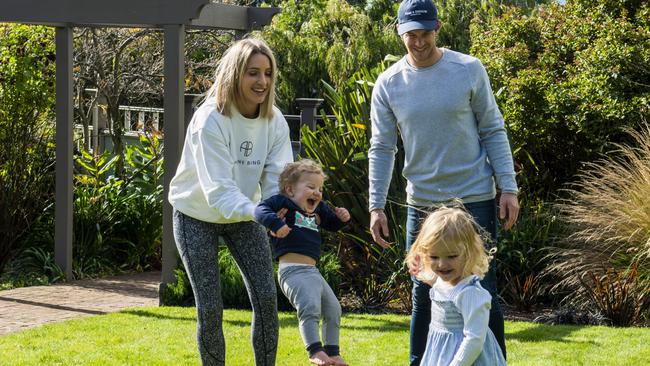
Early this month, while Paine and The Weekend Australian Magazine engaged in a number of long, casual conversations, the ICC announced the Australian Test side had risen to the top of its rankings. Last winter they went to England and defended the Ashes – something no side had done for the best part of two decades. More importantly, Australia’s elite players have won their way back into hearts that had hardened against them.
Through it all Paine remains unchanged. He, his wife Bonnie and their two children have moved to a slightly better house, one he keeps immaculately clean because he cannot stand things out of place. He’s in the market for a second-hand ute to take his garden waste to the tip and reckons he’s onto one that he can get for $3000. He’s unguarded, unhurried and unaffected by a job that’s been as much a burden as a blessing. And lately, of course, he’s been spending plenty of time with the kids. “Big day in our house, mate,” he tells me at one point. “Milla’s just done her first poo in the toilet.”
Milla’s the eldest, she’s turning three; her little brother Charlie is 19 months, and both are growing up in Hobart just like their dad and mum did. Just like generations of their families have. Both are fiercely proud of their Tasmanian heritage and have roots deep in the sporting turf.
Time on the phone with the Paines is enlightening. A teammate tips in his captain for being a neat freak, and Paine admits he can be a little obsessive. “I clean my gear religiously, the boys laugh at me all the time about it,” he says. “After a session I’ll get the alcohol spray out and squirt it on the pads, wipe them down. I clean my shoes when we come in for lunch. I like my gear to look clean and pristine. I’ve always had gloves I use for training and ones for the match. I’ve got a separate game day kit. I’ve got Shield kit. I’ve got Test kit and I’ve got club kit. They’re all in different bags and I never mix them up. I like my gear looking good and I’ve been like that since I was young.
He’s a clean freak around the house too. “I’m a chronic vacuumer,” he adds. “Bonnie thinks I’m a bit OCD.” He raises his voice so his wife can hear the conversation. “I’ve only vacuumed once today, haven’t I Bon?” he yells, then lowers his voice to concede “it drives her mad”.
She takes the phone and describes how he has to clean the kids’ toys up every time they leave the room, and vacuums the floors whenever the dog goes out the back. He has dozens of pairs of sneakers, all perfectly clean and ordered in the cupboards, shirts arranged in rows.
“It’s all where it should be,” he says. There’s a similar feeling about Paine and his team.
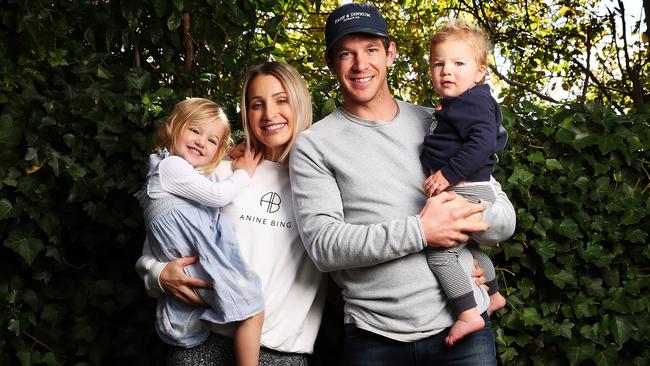
On summer days you could always find “the little blond boy from Lauderdale”, his elder brother Nick and a rag-tag group of mates dragging a turf roller from Matthew Wade’s grandfather’s shed along the quiet streets of the small town on the outskirts of Hobart, towards another neighbour’s house. The “little blond boy” was the moniker given him by the parents who gathered on the bitterly cold mornings for junior football and the warmer days when the cricket season elbowed its way into the calendar. Small, often playing above his age group, distinctly fair of hair, tenacious and precociously talented, he was the sort of kid people noticed. Tim’s father John ran – and still does – a local furniture business and might be the man who handed down the cleaning gene. “There is not a stain John Paine can’t get out of a couch,” his son says. His mum is a stenographer. His grandmother is his biggest fan.
“He was always quite small for his age and he was the little brother so he had to learn to hold his own with the older ones,” his mother says. “When they were little the three of them played tee-ball – there was he and Nick and then Meagan’s in the middle, but they played in the same team. Tim would come up to bat and he was so little they’d bring the field in – and every time he’d hit it over their heads and he would get a home run. He used to belt the living daylights out of it.”
Tim, Nick, Meagan and the youngest sibling Madeline lived with their mum and dad in Bambra Street, a quiet road running down to the water. There wasn’t a lot of traffic in Lauderdale, a small town nestled on the isthmus that connects South Arm Peninsula to the mainland, but there were plenty of like-minded children. Football and cricket matches were played on the road without too much interruption. “There were five or six families with kids a similar age to us,” Paine says. “We were always kicking the football or playing cricket in someone’s yard or on the street. There was plenty of time to see a car coming and get the wickets off the road.”
The serious games were played at the home of Wade’s cousin, Andy Matthews, who was Paine’s best friend. Calls went out in the morning; the teammates lived within minutes of each other. The games had a certain summer rhythm and were fiercely competitive. “We’d roll the wicket. We’d take a long time doing it, we took it very seriously,” Paine says. “There were paintings of state sponsors on the grass, we had sponsors on the stumps, we used to paint the crease in properly. It was the best wicket in Lauderdale, a nice size, not too big, not too small. We could all walk there in two or three minutes. We looked after that ground. We used to go to Wadey’s pop’s to get the roller, push it along Terrina Street. I can only imagine now what people in their cars were thinking seeing five or six kids pushing a roller around the streets, but the wicket had to be prepared.”
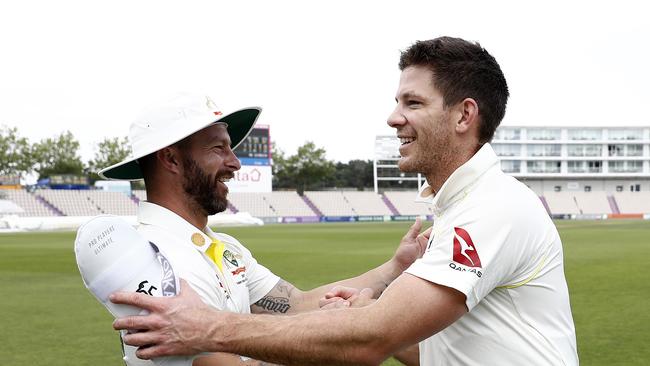
And to think, two of them – Paine and Wade – would go on to play for Australia, one as captain, both at different times the wicketkeeper. Wade, son of hard-nosed Hawthorn footballer Scott, was a few years below Paine at Lauderdale Primary School. He took the job behind the stumps when Paine lost his way through injury, and remade himself as a batsman when his childhood friend came back to the team.
Oh, but there’s so much water to flow under the Tasman Bridge before those competitive little Tasmanian boys walked out together in last winter’s Ashes. Plenty of water, pain, frustration, scandal and misgiving.
Wade’s family still lives in Lauderdale. He remembers ringing his cousin, Andrew Matthews, first thing in the morning, jumping on his bike and heading for matches in aunty Lisa and uncle Allen’s backyard. “It blows my mind now when I visit mum at the home I lived in to think two Test cricketers grew up within two kilometres of each other in a small community, two kids who went to the same school, played for the same small clubs and in the same backyards. To think about those days and where we ended up … I was younger than Tim and he was younger than his brother and his mates. You had to learn to hold your own.
“He was a terror, like we all were, we were all high-energy kids. There were plenty of fights and arguments and I’m sure he would attest those backyard games quickly got your skill set up and your mental side up to the contest, we were always the youngest and we had to find a way to get the job done or you’d get shipped off the team pretty quickly if you weren’t performing.”
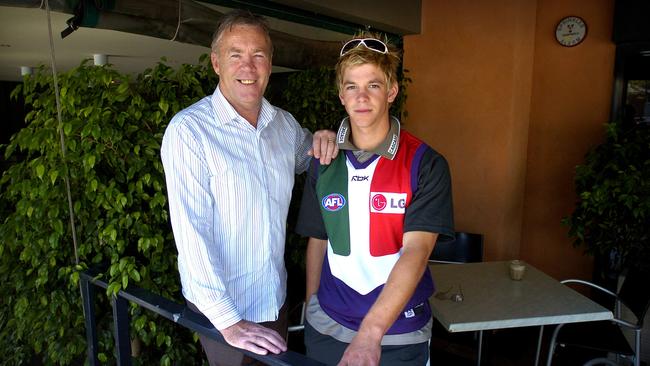
Nick says early back problems can be blamed on bowling to a little brother who was determined not to be beaten. Paine’s uncle on the maternal side, Sally’s brother, is Robert Shaw, a Sandy Bay footballer who crossed the Strait and spent eight injury-interrupted years at Essendon before going on to coach Tasmania, Fitzroy and Adelaide. Paine’s first visits to the mainland were to stay with the Shaws when Robert was coaching in the AFL and his uncle remembers having his nephew sit with him on the bench when he coached Tasmania to a famous victory over David Parkin’s Victoria in 1990. The talent for and love of cricket and football ran in the DNA on both sides of the family. Grandparents and parents, like siblings and school mates, loved, participated in and dominated Hobart leagues. Tim and Nick were champion footballers, both their grandfathers kept wicket and mum Sally was a state-level softball player. But as Wade observes, it all started in the backyard.
Robert Shaw can remember summer cricket games at his sister’s family home where the adults, just like the elder brothers, tested the youngest. “I’d bowl to him, his grandfather bowled to him and he was always pretty small and I know this is going to sound funny, but he just used to get hammered, he used to get the shit bounced out of him by his older brother and by me, and so he has always been an internally tough kid. That comes through now – the face you see is not the person inside. Playing district cricket in Tasmania as a 14- or 15-year-old, he copped the same hammering. He had to be tough to survive. They treated him with disdain, asked him if he should have been in primary school.
“He’s not a vicious sledger but he is clever and he stands up to anyone.”
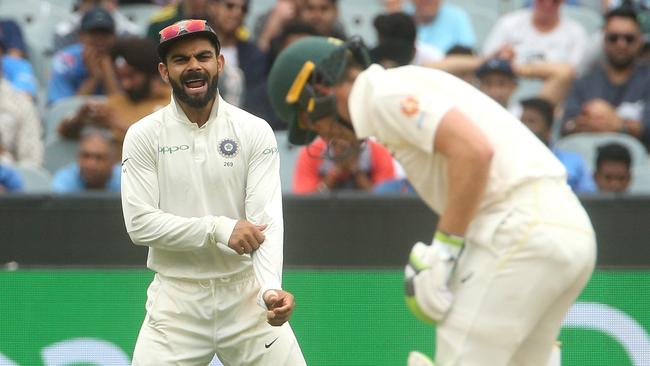
Years later, Paine’s Australian side, browbeatenby events and public opinion, didn’t know how to conduct itself or reply when India arrived bristling with captain Virat Kohli’s physical and verbal aggression. Paine consulted coach Justin Langer and drew on lessons from the early days, figuring a mix of humour and defiance was the best approach. In on-field banter at the MCG he suggested young wicketkeeper Rishabh Pant, who was soon to be replaced, might join Paine’s Hobart Hurricanes and undertake a bit of babysitting. “You can come over for dinner. Do you babysit? I’ll take my wife to the movies, you can look after the kids?” In Perth, stump microphones picked up Paine saying to Murali Vijay: “I know he [Kohli] is your captain but you can’t seriously like him as a bloke.”
At all times he is impeccable and unflappable, a smile on his face, his body language calm. Uncertain at first, Australians started to see something they liked. Call it an acceptable level of aggression. Label it larrikin. Banter, not abuse, is the line coach Langer insists upon. He calls Paine “the toughest pretty boy in the game”. Bit by bit, people have noticed that the job he set out to do that night in South Africa, when he excused himself from his mother, was to find a way for Australian cricket to be respected again. He might look laid-back and practise a disarming charm, but he learnt not to flinch from an early age.
“He hasn’t changed one iota since he has been captain,” Sally says. “He is just himself, he’s got that sense of humour, he’s a bit of a smart alec, but good-natured. I don’t think anything will change him; that’s just Tim. He likes to big-note himself to us in private but we just roll our eyes and laugh. He’s pretty ordinary – what you see is what you get. Very down to earth.”
Fellow Tasmanian cricketer George Bailey remembers a “street-smart kid with a baby face that lured a lot of opponents into thinking they could dominate him, but he was always very competitive and always had the last word”.
Paine raced through the ranks of junior football and cricket. It seemed he could do anything: Wade says he remembers his mate batting left-handed (he’s a right-hander) in a game of cricket at school and still making 30 or 40. Sport was easy.
Local Anglican school Hutchins, an institution founded in 1846 that aims to produce “men of character”, tried to lure him to its Sandy Bay field with the offer of a scholarship, but Paine wanted to go with his mates to Rokeby, the local state high school. Paine concedes with a sigh that he was “pretty well-behaved at school but from a very young age more interested in cricket than maths and science”. He didn’t make it through to his final year because state cricket came calling. Later, when his career collapsed, he would regret that decision. “I still do,” he admits. When cricket was giving way and he had little more than his good looks and street smarts to fall back on, the pressure was almost crippling.
The wicketkeeper batsman was the youngest ever to be offered a state contract, signing on for around $10,000 as a 16-year-old in June 2001; back then, while solid of body, he could still pass for 12. “I was still getting asked for my ID when I was 30,” Paine says. He and Nick were still spending the lunch break eating sandwiches in their grandmother’s car. She never missed a game and her cornflake biscuits are the stuff of legend.
He played second division state cricket in junior batting pads. Gnarly Tasmanian coach Greg Shipperd remembers driving to John Paine’s furniture business to discuss his son’s elevation and assure him he was on the right path. “We crossed our fingers and hoped we were doing the right thing, but he was a tough little soul,” he says. The first game, against a NSW XI bristling with old-school quick bowlers, he was trapped LBW and could hardly walk from the field because it hurt so much.
His signing was noticed by ESPN Cricinfo, which ran a small piece by John Polack in 2001. “By any measure, the teenager already has a glittering list of accomplishments behind him,” Polack wrote. “He has accumulated first-grade experience at – not to mention a first-grade century for – the University club in Hobart. He has also captained his state at Under-15 and Under-17 level. He became a member of its Under-19 team at the age of just 15, and has been the vice-captain of the Australian under-17 side.”
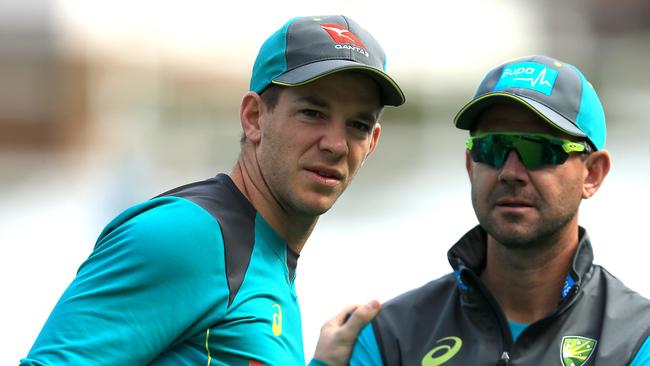
Paine was steeped in the traditions of Tasmanian sport. One of a long line of footballers and cricketers, Ricky Ponting and David Boon the most notable among them, who took the island’s distinct brand of stoicism to the mainland and then the world’s sporting stage. “We were always brought up as the underdogs,” Paine says. “It is bred into us at an early age. You went to stuff as a Tasmanian kid and it was us against the world, you felt like you constantly had to prove yourself and show you were worthy and the same as people from the bigger states. You grew up down here with a chip on your shoulder at times, which can be a good thing.
“Tasmania is a unique place, I can’t put my finger on it, but it builds a resilient, passionate type of people. We’re a smaller state, we’ve got colder weather and you feel like you’re doing it harder than other people coming through. We felt we had to try harder and it gave us more confidence in a way. If you could catch balls in Hobart at 8am when it was three degrees, you are going to catch them anywhere.”
The state didn’t rush him, but given the chance to play senior cricket for Tasmania in 2005 he scored a century in the domestic 50-over competition. In his second season he scored a double century. He was 21 years old and set for a golden future. His rise through the ranks seemed inevitable. He made his Test debut with Steve Smith at Lord’s against Pakistan in 2010, scoring seven and 47, taking four catches and stumping the Pakistan opener Salman Butt.
Then, back home, he broke a finger in a charity match and life took a strange, slow and unexpected twist. His second first-class century would come 13 years after the first.
Tim Paine only just made it to the 2017-18 summer. Tasmanian cricket had grown tired of its ageing tyro who could not shake off physical and mental demons and who could not, more importantly, score runs. It offered him what amounted to a base level one-year contract, a token gesture. He read the writing on the wall and decided it was time to prepare for life as a working-class stiff. He and Bonnie had just become parents and the carefree days were over.
Four months after Ricky Ponting handed him his baggy green at Lord’s in 2010, Paine was playing in a fundraising match at the Gabba, batting against Dirk Nannes with an earpiece so he could talk to the Channel 9 commentary team. He hit an early four and then Nannes, who could be quick and difficult to handle, bowled a faster delivery that hit the young Test star on the right index finger.
“It bloody hurt,” Paine recalls. “I had Mark Taylor in my ear saying, ‘Are you going to be all right?’ and I said, ‘Ahhh, I don’t think so’. I looked down and my finger was a mess – it wasn’t your normal break, it was caved in.”
Paine was supposed to be out for six weeks but for the next six seasons Brad Haddin, Matthew Wade and Peter Nevill rotated behind the stumps in the national side while he slipped in and out of first-class cricket.
Determined to play the World Cup in the new year he came back too early, rushing his rehabilitation. Ed Cowan wrote in his tour diary of the 2011 series that four weeks after surgery Paine was back doing catching practice with a finger “the size of a Hungarian sausage”. A succession of setbacks followed. He had seven operations, including unsuccessful bone grafts from the wrist and one from a hip. Plates and pins were inserted, shifted and came loose under protest. One day in the foyer of the Tasmanian Cricket Association he showed reporters the index finger in question. It was swollen, unbending and scarred from a series of operations.
“It just didn’t heal. I still hold the bat differently now,” he says. “The index finger on your bottom hand is pretty important, but mine is pretty much non-existent on the bat now. I hold it with the other three and my thumb, which is why the bat face is a bit closed. It probably helped my pull shot though.”
To this day you can see the pain rise from the vestigial damage when that finger takes a knock on the field. When he finally came back after two years of medical procedures he faced another problem. Runs didn’t come and the harder he tried, the worse he went. It became a serious psychological issue. “It seemed to hit me like a truck five minutes before I had to bat. I never had any issues with my keeping but my batting was absolutely shot. I never told anyone that, but deep down I was nowhere. I had no idea how I was going to get a run, I was lost.”
Paine admits to getting “punchy”. Standing in as captain of Tasmania he was impatient with teammates. Ricky Ponting watched his frustrations rising and remembers hearing the tension through stump mikes in Big Bash League matches. Dropped to the seconds, Paine calmed down and found himself again.
Wade, who’d moved to Victoria in 2007 because of the logjam of keepers in front of him in Tasmania, went back home and Paine found himself out of the side because, basically, his best days were done.
Earlier, Ponting had heard that Paine was looking to quit and take up a job with sports equipment company Kookaburra and intervened, ringing the state authorities and telling them they were making a mistake if they let him go. “They had a heap of keepers and a group of younger guys they wanted to give a go and basically Painey’s batting wasn’t great, but he was clearly the best keeper in the country and I just thought, with where Tasmanian cricket was at that time, having somebody like him was important. He was a homegrown Tasmanian player who had played for Australia and could play for them again and to lose guys like that out of our system, I wasn’t comfortable with that.”
Greg Chappell played a role, too. After Haddin retired, the side had experimented with Wade and Nevill but was never satisfied. Chappell suggested they go back to the best wicketkeeper in the country, a strange call given Paine was not considered good enough to keep for his state. Haddin had made a similar suggestion to selector Mark Waugh before retiring and so a plan was hatched to get him into an Australia A side before the Ashes. Tasmania agreed to play him as a batsman in the last first-class match before the first Ashes Test and he came through with a half-century in the second innings.
Still, Paine was as surprised as anyone by his recall. When he left the field a reporter asked him what it was like to be back in the Australian side. It wasn’t official yet but was being widely reported that day as “a bombshell” (The Australian) and “[one of] the biggest selection shocks of recent times” (Fairfax). Veteran ABC broadcaster Jim Maxwell described it as “unhinged”. Selectors admitted there had been “lengthy debate”.
The injury had its upsides. Paine, who was flying to Melbourne every three weeks for the best part of two years in order to see the surgeon and attend a hand clinic, put the trips to good use by looking up a young Hobart nurse, Bonnie Maggs, who was working on the mainland at the time. Eventually she moved back to Tasmania to be with him and they started a family.
“I wasn’t that happy when he got picked for Australia,” Bonnie concedes. She didn’t know much about cricket and readily admits she had no idea how important Test cricket was. To her it was another game and more time away. When she got to Brisbane for the first game of the Ashes its import dawned on her. She admits Googling how long a Test match lasted while in their hotel room. Five months later she was the First Lady of Australian cricket, the next summer she was holding the baby at the Prime Minister’s residence and posing for pictures with the Indian player Pant, who momentarily accepted the role of babysitter.
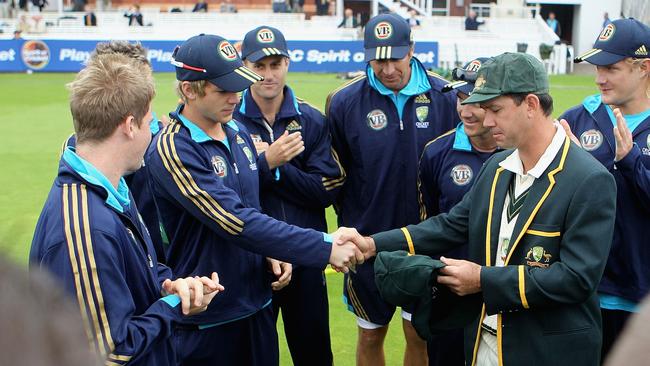
Paine could not enjoy his coronation as Australia’s 46th captain because of the circumstances in which he ascended to the throne in 2018, and it stayed that way for some time. The side was humiliated in England in what was his first and last outing as captain of the ODI team. It returned from two Tests against Pakistan (losing the series 1-0) and then lost in Adelaide to an Indian Test side lording it over the home side.
In the Perth match, when he stood up to Kohli, they had their first win and the tide of their fortunes changed on and off the field. Paine admits it was the first time he could enjoy the job. Being captain of a losing side is no fun.
He and Langer have formed a good relationship, although they’re polar opposites. The coach, a former opener, is passionate and occasionally emotional, while his skipper is level-headed and rarely given to outbursts. “There’s no ego there,” Langer says of the dynamic. “In the past we have seen these relationships work poorly… but my view is and his is that there is no boss, we work well together, we both have roles in leadership.
“He’s used Steve Smith and David Warner really well, 99 per cent of the time he keeps calm body language, he leans on the other coaches, he is a ripping bloke, he is the best wicketkeeper in the world and he is a really popular person and he is quite tough; he has some layers to his journey. There was talk early of him being a future Australian captain but he went through that tough time and was about to retire. He’s got a good perspective on life because of that, he’s come through the tough times and learnt from it.”
Paine’s Australia retained the Ashes – a feat that sides led by Ricky Ponting and Michael Clarke were unable to achieve in decades previous. But small errors by Paine had huge consequences, particularly on the last day of the third Test in Leeds last August. A wasted review, a missed run out and mistakes setting the field in the dying moments proved inordinately costly. Paine was at his worst and best that day. On the field he lifted a distraught Nathan Lyon from the grass when the game was lost; in the dressing room he gave an address for the ages, insisting his broken players believe in themselves and their game plan. He was cricket captain turned old-school football coach. Ron Barassi would be proud.
Paine admits he was “fuming” in the shower before talking to the team. “There were so many things we could have done better, but when I calmed down I was convinced we were a better team, we should have won that game and we didn’t, but I knew we were the best team.” A leader moves on quickly, and insists the team follows. Australia won the next Test and retained the urn.
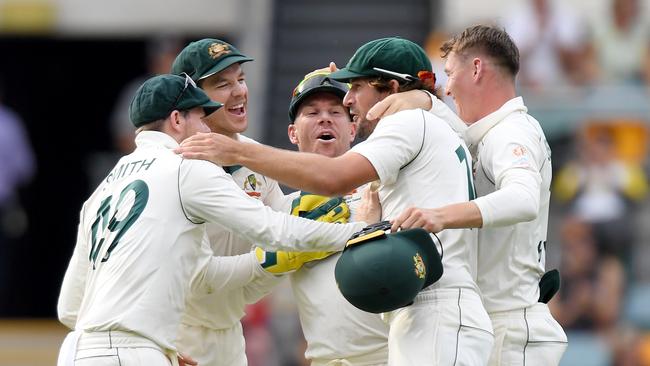
The team have not played their best cricket yet, but there’s a sense it is approaching. Ponting, who has watched from the commentary box and mentored from the coach’s box, says Paine has been “outstanding”. There is a sense, after all the sadness and anger surrounding events that led to him becoming a captain of convenience, that he’s the captain this country craved. Right man, right place.
At the end of the recent Amazon Prime series The Test, which follows the side from the time of Paine’s appointment to the moment they retain the Ashes, a number of people reflect on where they have got to. The Australian’s cricket writer Gideon Haigh probably puts it best: “We like them more than we used to and I think that’s more important than being proud of them,” Haigh says.
In January this year Paine won praise from the phlegmatic former captain Ian Chappell. “Paine’s undemonstrative demeanour and capable leadership has not only seen Australia emerge from the rubble of Cape Town to become a top-level team, it’s also resulted in their reputation rising from the depths to the heights,” Chappell wrote. “Paine has overseen this resurgence with a quiet but steely resolve, a thoughtful approach and a splash of humour that helps relieve Test cricket’s tensions.”
Paine puts it simply: “I’ve joined an unbelievable list of names in our sport as captain but it doesn’t change anything about how I play the game or the way I act or anything like that, it has just become part of my life. For me, every game is a bonus, captain or not.”

To join the conversation, please log in. Don't have an account? Register
Join the conversation, you are commenting as Logout